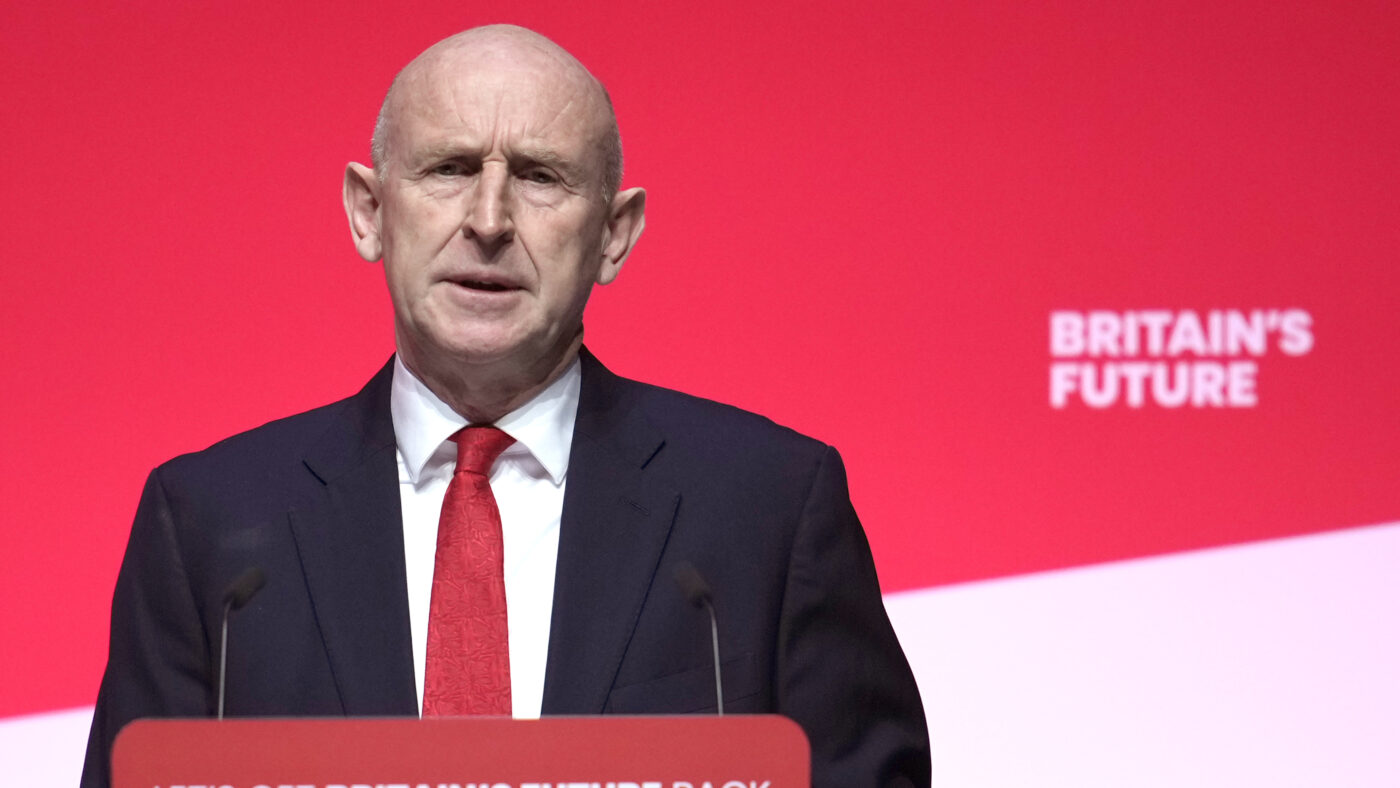For a Conservative, these are fairly bleak times. However you regard the incumbent government, all the empirical data point towards a Labour victory at this year’s general election. Our likely new overlords believe in the heavy hand of the state and the performative virtue of high taxation, and regard the Brexit referendum, more than seven years on, as Black Thursday.
For all that, John Healey, the Shadow Defence Secretary, has quietly and rationally put serious thought into the future of the United Kingdom’s national security. Healey is an emollient Yorkshireman who was a minister for most of the New Labour years and, like Sir Keir Starmer, is in his sixties. But there are occasional signs that he shares some of the less desirable traits of his noisier colleagues.
Last month, after visiting NATO headquarters in Brussels, he told journalists that one of his priorities as Secretary of State for Defence, ‘directly after the election’, would be to establish a ‘systematic cooperation and a defence and security pact with the European Union’. The UK already participates in a military mobility project with the EU under the auspices of Permanent Structured Cooperation (PESCO); this is designed to make it easier and quicker to move military forces across EU borders, and the US and Canada have also signed up to it.
Healey wants much more. He referred specifically to cyber-security, intelligence and logistics, as well as peacekeeping missions in the Balkans and round the Horn of Africa. He wants a ‘properly bespoke relationship’, which seems laudable enough, but the way in which his whole thinking is framed is strangely skewed.
For many Remainers, the vote to leave the European Union represents an ongoing trauma and a horror which they cannot yet accept as real. It is a source of national shame for them, and Healey seems to embrace this mentality. If Labour wins the election, he says, ‘we must rebuild relationships with key allies and with the European Union’ – note that word, ‘rebuild’ – ‘relationships that were badly damaged, sometimes deliberately so, during the Brexit process’.
That lays out the fundamental narrative: Britain did a terrible thing, we disgraced ourselves in front of our endlessly patient European neighbours, and it is vital that we now seek to expiate our sins and rehabilitate ourselves in their eyes. Leaving aside the persistent but risible notion that the UK always acts out of base and cynical self-interest while the EU pursues nothing but high-minded idealism, this presents a real risk to our existing defence arrangements and strategic partnerships.
Healey noted that the EU would ‘welcome support’ in its peacekeeping missions. No doubt this is true, though one might note that, in 2022, Germany, the EU’s biggest spender on defence, withdrew from Operation Atalanta, the anti-piracy mission off the coast of Somalia.
The relationship can be viewed in the opposite direction, however: when the United States established Operation Prosperity Guardian in December 2023 to protect commercial shipping through the Red Sea, France and Italy, which had naval units in the area, stressed that these would remain under sovereign national control. Spain, which currently leads Operation Atalanta and hosts the headquarters of EUNAVFOR, the military component, refused to participate in a mission led by the US and vetoed extending Atalanta’s mandate to include the Red Sea. The Netherlands volunteered to contribute two naval officers. So perhaps we need a wider discussion of burden-sharing in the face of global threats.
Labour also has to consider the effect a more formal cooperation arrangement with the EU would have on NATO, which is and should remain the cornerstone of our strategic posture. Our European neighbours – and NATO partners – are not always neutral actors here. In 2019, President Macron talked of ‘the brain death of NATO’ and the need for Europe to regain ‘military sovereignty’. When Vladimir Putin accused him last month of breaking off their bilateral relationship, the president of the French Republic responded ‘I haven’t changed my number’.
We need to look at how the next few years are likely to unfold. There is a strong chance that Sir Keir Starmer could move into Downing Street a few months ahead of a second Trump presidency, and, if that happens, it will pose fundamental questions for NATO. The 45th president of the United States once told John Bolton, his national security adviser, ‘I don’t give a shit about NATO’, and we should, for once, take him at his word. If a restored Trump sees not only the EU cultivating its own defence institutions but the UK earnestly trying to make friends with them, it will send a powerful signal about how Europe regards the alliance.
The Labour Party has to escape the psychodrama of Brexit – just as some of the victorious combatants on the right have to – and think in realistic strategic terms. Where are the UK’s national interests? What capacity do we have to support them? And who are our most useful and reliable allies? Defence policy cannot be part of an extended amende honorable for what it sees as unacceptable decisions. This persistent, apologetic cringing has to stop before it does the UK real harm.
Click here to subscribe to our daily briefing – the best pieces from CapX and across the web.
CapX depends on the generosity of its readers. If you value what we do, please consider making a donation.


